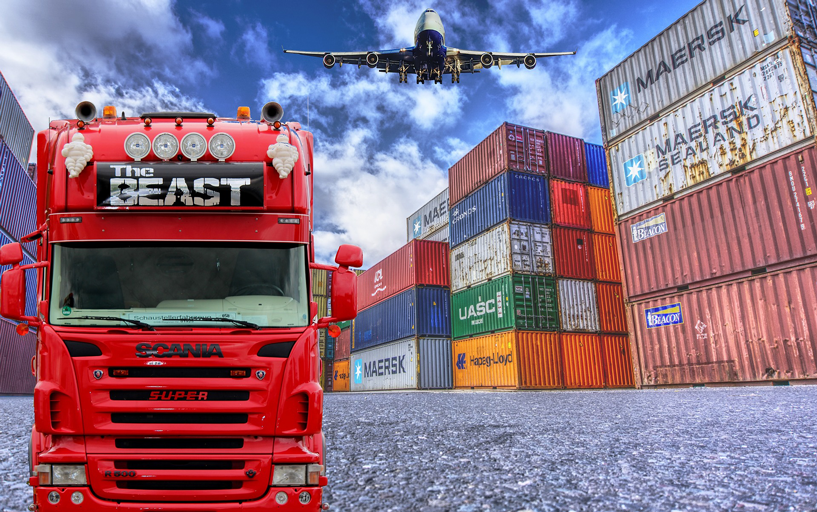What is Blockchain Logistics?Blockchain Logistics is the application of a decentralized, distributed ledger to facilitate the movement of goods, information, and finances. It also includes the use of smart contracts to automate supply chain functions. Major companies such as Walmart and DHL are currently testing and adapting the use of blockchain technology to improve supply chain transparency and traceability. (*)As more and more companies begin to realize how blockchain logistics can enhance the efficiency of supply chain management, the use of blockchain by logistics companies will become the new standard. The blockchain is predicted to grow to a $7.68 billion industry by 2022. (*)This article explores the benefits of using blockchain logistics to improve supply chain transparency and product traceability.  Promotes a Culture of CollaborationYves Morieux, a world-renowned business consultant who has dedicated his life to discovering new ways to simplify business processes, states that collaboration is the key to simplification. Morieux uses the example of departmentalization in an enterprise to illustrate how complexity can be simplified through collaboration. (*) For instance, in the automotive industry, there are several departments: engineers, designers, safety & compliance, marketers, research & development, etc. If each department worked in isolation, it would be nearly impossible for the automobile to come together. The need for collaboration isn’t solely an interagency problem; it affects supply chains as well.With suppliers in Africa & South America, manufacturers in China & Indonesia, headquarters in North America & Europe and global distribution channels, collaboration between entities is imperative to turn a raw product into a marketable good. When supply chain disruptions occur, the customer pays for it through higher prices and businesses can temporarily lose a competitive advantage.The blockchain is a system of collaboration. As a distributed, decentralized network, rather than independent, centralized systems, Blockchain promotes a culture of cooperation in the logistics sector.Strengthens Customer and Public RelationsA blockchain enabled traceability system builds trust with customers and the public. When consumers know that a product is safe and ethically-sourced, they are more likely to purchase the product. Reasonable consumers won’t buy a product if they know it will make them sick. Therefore, ensuring that the product has been kept in the appropriate conditions and is not expired. For example, dairy products can expire exceptionally quickly. Milk needs to be stored between 0°C and 4°C for safe consumption. The Internet of Things (IoT) allows for smart traceability and can track the temperature of the milk from the cow to the shelf at the grocery store.By recording the temperature of the milk using the blockchain, customers at the supermarket can scan the label and receive verifiable information about the milk. Customers will be able to see the origin of the milk, the date the milk was put into the jug, where the milk was transported before arriving, and of course the temperature.Fast Tracks Movement of Goods Through CustomsWhen goods cross national borders, they are required to go through customs upon arriving in another country. Customs enforcement agents ensure that contraband and exotic species do not enter the country and that taxes and tariffs are paid. Customs enforcement agents can quickly approve the shipment since blockchain traceability provides a certified record. This record includes information such as where the product is sourced and if the appropriate taxes and tariffs are paid. The current use of paper and electronic documents to verify transaction can significantly slow down the movement of goods through customs. Sometimes a shipment can be held up for weeks because a single piece of information is missing, having a significant impact on the supply chain as a whole. For example, the manufacturer may need to stop production or purchase the raw materials from a more expensive vendor if the original order is held up in customs.Each scenario causes the price of the good to rise which ultimately hurts the consumer who has to pay for the good. Companies who adopt blockchain traceability technology will undoubtedly have a competitive advantage since it will fast-track shipments through customs.Ensures Accurate Invoicing with Smart Contract ExecutionEvery business owner understands the need for accurate invoicing and accounting practices. However, inaccurate invoices are sent, received and paid every day. Furthermore, a study found that 63% of companies have received duplicate invoices.(*) It also found that paper invoicing is still an ‘established norm. (*)Smart contracts will ensure accurate invoicing in the logistics industry.Smart contracts automatically execute the terms of an agreement based on the completion of specific triggered events. For example, when the manufacturer places an order, the smart contract debits the account of the manufacturer. The raw materials are shipped by plane from the supplier to the country where the manufacturer is based. When the plane lands in the manufacturer’s country, the smart contract credits the account of the airline and pays the appropriate taxes and tariffs. The order is shipped from customs to the manufacturer’s warehouse by truck. When the warehouse marks the goods as received, the trucking company gets a credit. After the manufacturer inspects the products, the smart contract credits the supplier’s account less any damaged materials.As demonstrated by the example, smart contracts and blockchain transportation logistics also ensure invoice accuracy between the transportation and logistics industries. Smart contracts also save costs by reducing the number of accountants needed to process invoices. In an enterprise, a single invoice may involve 15 accountants and employees. 7 Smart contracts can reduce this number to 2 – one accountant to program the smart contract and one accountant to verify the transactions.Why Choose NeuroChain as Your Blockchain Logistics Provider?While blockchain technology can improve supply chain transparency and product traceability, the current blockchain has a significant flaw: it is not scalable. If blockchain is to facilitate product traceability across a global supply chain, it will need to be scalable. NeuroChain is the next generation of blockchain that solves the scalability problem . By applying Machine Learning and Artificial Intelligence to the blockchain and by inventing the proof of involvement and integrity consensus protocol, NeuroChain can improve supply chain transparency and product traceability. (*)https://www.logistics.dhl/content/dam/dhl/global/core/documents/pdf/glo-core-blockchain-trend-report.pdf(*)www.marketsandmarkets.com/PressReleases/blockchain-technology.asp(*)www.ted.com/talks/yves_morieux_as_work_gets_more_complex_6_rules_to_simplify(*)www.dairygoodness.ca/milk/how-to-store-milk(*)www.cimaglobal.com/Documents/Thought_leadership_docs/white-paper-hub/2016-04-12-Invoice-Benchmark-Report.pdf
Promotes a Culture of CollaborationYves Morieux, a world-renowned business consultant who has dedicated his life to discovering new ways to simplify business processes, states that collaboration is the key to simplification. Morieux uses the example of departmentalization in an enterprise to illustrate how complexity can be simplified through collaboration. (*) For instance, in the automotive industry, there are several departments: engineers, designers, safety & compliance, marketers, research & development, etc. If each department worked in isolation, it would be nearly impossible for the automobile to come together. The need for collaboration isn’t solely an interagency problem; it affects supply chains as well.With suppliers in Africa & South America, manufacturers in China & Indonesia, headquarters in North America & Europe and global distribution channels, collaboration between entities is imperative to turn a raw product into a marketable good. When supply chain disruptions occur, the customer pays for it through higher prices and businesses can temporarily lose a competitive advantage.The blockchain is a system of collaboration. As a distributed, decentralized network, rather than independent, centralized systems, Blockchain promotes a culture of cooperation in the logistics sector.Strengthens Customer and Public RelationsA blockchain enabled traceability system builds trust with customers and the public. When consumers know that a product is safe and ethically-sourced, they are more likely to purchase the product. Reasonable consumers won’t buy a product if they know it will make them sick. Therefore, ensuring that the product has been kept in the appropriate conditions and is not expired. For example, dairy products can expire exceptionally quickly. Milk needs to be stored between 0°C and 4°C for safe consumption. The Internet of Things (IoT) allows for smart traceability and can track the temperature of the milk from the cow to the shelf at the grocery store.By recording the temperature of the milk using the blockchain, customers at the supermarket can scan the label and receive verifiable information about the milk. Customers will be able to see the origin of the milk, the date the milk was put into the jug, where the milk was transported before arriving, and of course the temperature.Fast Tracks Movement of Goods Through CustomsWhen goods cross national borders, they are required to go through customs upon arriving in another country. Customs enforcement agents ensure that contraband and exotic species do not enter the country and that taxes and tariffs are paid. Customs enforcement agents can quickly approve the shipment since blockchain traceability provides a certified record. This record includes information such as where the product is sourced and if the appropriate taxes and tariffs are paid. The current use of paper and electronic documents to verify transaction can significantly slow down the movement of goods through customs. Sometimes a shipment can be held up for weeks because a single piece of information is missing, having a significant impact on the supply chain as a whole. For example, the manufacturer may need to stop production or purchase the raw materials from a more expensive vendor if the original order is held up in customs.Each scenario causes the price of the good to rise which ultimately hurts the consumer who has to pay for the good. Companies who adopt blockchain traceability technology will undoubtedly have a competitive advantage since it will fast-track shipments through customs.Ensures Accurate Invoicing with Smart Contract ExecutionEvery business owner understands the need for accurate invoicing and accounting practices. However, inaccurate invoices are sent, received and paid every day. Furthermore, a study found that 63% of companies have received duplicate invoices.(*) It also found that paper invoicing is still an ‘established norm. (*)Smart contracts will ensure accurate invoicing in the logistics industry.Smart contracts automatically execute the terms of an agreement based on the completion of specific triggered events. For example, when the manufacturer places an order, the smart contract debits the account of the manufacturer. The raw materials are shipped by plane from the supplier to the country where the manufacturer is based. When the plane lands in the manufacturer’s country, the smart contract credits the account of the airline and pays the appropriate taxes and tariffs. The order is shipped from customs to the manufacturer’s warehouse by truck. When the warehouse marks the goods as received, the trucking company gets a credit. After the manufacturer inspects the products, the smart contract credits the supplier’s account less any damaged materials.As demonstrated by the example, smart contracts and blockchain transportation logistics also ensure invoice accuracy between the transportation and logistics industries. Smart contracts also save costs by reducing the number of accountants needed to process invoices. In an enterprise, a single invoice may involve 15 accountants and employees. 7 Smart contracts can reduce this number to 2 – one accountant to program the smart contract and one accountant to verify the transactions.Why Choose NeuroChain as Your Blockchain Logistics Provider?While blockchain technology can improve supply chain transparency and product traceability, the current blockchain has a significant flaw: it is not scalable. If blockchain is to facilitate product traceability across a global supply chain, it will need to be scalable. NeuroChain is the next generation of blockchain that solves the scalability problem . By applying Machine Learning and Artificial Intelligence to the blockchain and by inventing the proof of involvement and integrity consensus protocol, NeuroChain can improve supply chain transparency and product traceability. (*)https://www.logistics.dhl/content/dam/dhl/global/core/documents/pdf/glo-core-blockchain-trend-report.pdf(*)www.marketsandmarkets.com/PressReleases/blockchain-technology.asp(*)www.ted.com/talks/yves_morieux_as_work_gets_more_complex_6_rules_to_simplify(*)www.dairygoodness.ca/milk/how-to-store-milk(*)www.cimaglobal.com/Documents/Thought_leadership_docs/white-paper-hub/2016-04-12-Invoice-Benchmark-Report.pdf
NeuroChain, let’s build a better world!
Photo credits: Pixabay, unsplashFollow us on Telegram, Facebook, Twitter and YouTube. If you have any questions, feel free to get in touch with NeuroChain Team, and we will answer you as soon as possible!
